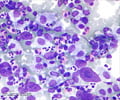Glossary
Chemotherapy: Treatment with anticancer drugs.Computer Tomography (CT) scan: This is an X- ray procedure enhanced by computer. The results are three dimensioned scan through a body part showing bone and body tissue.
DNA: The abbreviation for "deoxyribonucleic acid," the primary carrier of genetic information found in the chromosomes of almost all organisms.
Hodgkin's disease: A malignant disease of the lymphatic system that is characterized by painless enlargement of lymph nodes, the spleen, or other lymphatic tissue. It is sometimes accompanied by symptoms such as fever, weight loss, fatigue, and night sweats.
Immunosuppressant drugs: Drugs that can weaken or reduce your immune system's responses to foreign material. It reduces your immune system's ability to fight a transplanted organ.
Lymphoma: Cancer that arises in cells of the lymphatic system.
Lymph nodes: Part of the lymphatic system; bean-shaped organs, found in the underarm, groin, neck, and abdomen, that act as filters for the lymph fluid as it passes through them.
Lymphocytes: White blood cells that fight infection and disease.
Mutation: Any change in the DNA of a cell. Mutations may be caused by mistakes during cell division, or they may be caused by exposure to DNA-damaging agents in the environment. Mutations can be harmful, beneficial, or have no effect.
Non-Hodgkin's Lymphoma: A group of cancers of the lymphoid system, including acute lymphoblastic leukemia, B-cell lymphoma, Burkitt's lymphoma, diffuse cell lymphoma, follicular lymphoma, immunoblastic large cell lymphoma, lymphoblastic lymphoma, mantle cell lymphoma, mycosis fungoides, post-transplantation lymphoproliferative disorder, small non-cleaved cell lymphoma, and T-cell lymphoma.
Obesity: Overweight.
Oncogene: Genes present in normal cells that, upon exposure to cancer-inducing factors may lead to development of tumors.
PET scan: Positron emission tomography scan.-A computerized image of the metabolic activity of the body tissues used to determine the presence of disease.
Stem cells: Cells that give rise to a lineage of cells. Particularly used to describe the most primitive cells in the bone marrow from which all the various types of blood cells are derived.
Stem Cell Transplantation: A method of replacing immature blood-forming cells that were destroyed by cancer treatment. The stem cells are given to the person after treatment to help the bone marrow recover and continue producing healthy blood cells.
Tumor: A pathological tissue growth, characterized by uncontrolled multiplication of cells.







